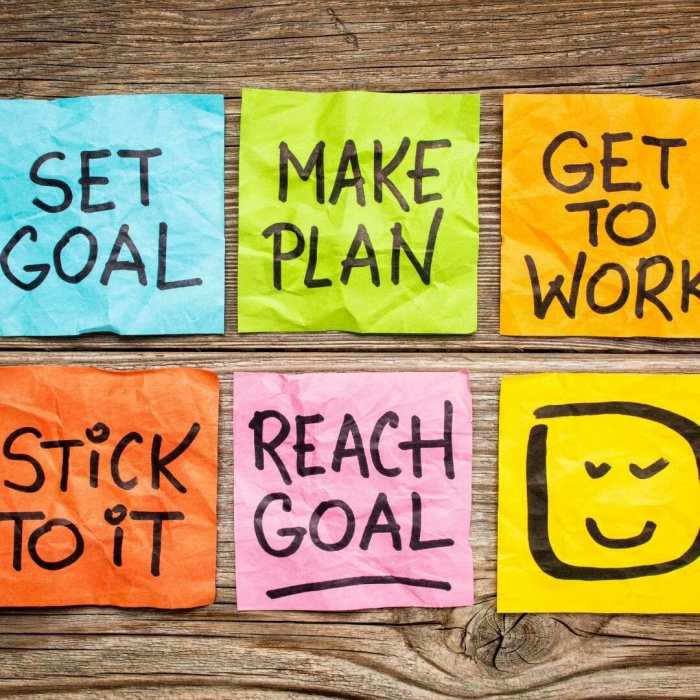Health and Fitness Goals set the foundation for a transformative journey towards overall wellness, encompassing physical and mental well-being in a harmonious balance. As individuals embark on this path, they are guided by specific targets that drive motivation and commitment, ultimately leading to a healthier and more fulfilling lifestyle.
Exploring the realms of setting goals, creating a balanced exercise routine, understanding nutrition’s role, and tracking progress become key pillars in this exciting adventure towards optimal health and fitness.
Setting Health and Fitness Goals

Setting specific, measurable, achievable, relevant, and time-bound (SMART) goals for health and fitness is crucial for success. These types of goals provide a clear roadmap and help individuals track their progress effectively.
Examples of Short-term and Long-term Goals
- Short-term goal: Run 3 times a week for 30 minutes each session for the next month.
- Long-term goal: Complete a half marathon within the next 6 months.
Setting short-term and long-term goals allows individuals to have a mix of achievable targets to work towards. Short-term goals provide immediate motivation and a sense of accomplishment, while long-term goals keep individuals focused on the bigger picture.
Importance of Goal Setting for Motivation
Goal setting helps individuals stay motivated and committed to their health and fitness routines. When goals are clearly defined, individuals are more likely to stay on track and push through challenges. Achieving milestones along the way also boosts confidence and encourages continued progress.
Creating a Balanced Exercise Routine
When it comes to crafting a well-rounded exercise routine, it’s important to include a mix of cardio, strength training, flexibility exercises, and rest days. This combination helps to target different areas of fitness and ensures overall health and wellness.
Cardio
- Cardio exercises like running, cycling, or swimming help to improve cardiovascular health, burn calories, and increase endurance.
- It is recommended to aim for at least 150 minutes of moderate-intensity cardio per week.
- Options include HIIT workouts, dance classes, or even brisk walking to keep things interesting.
Strength Training
- Strength training, such as weightlifting or bodyweight exercises, helps to build muscle, increase metabolism, and improve bone density.
- Include exercises targeting all major muscle groups, with a focus on proper form and gradual progression in weight or reps.
- Try incorporating resistance bands, free weights, or machines for variety.
Flexibility Exercises, Health and Fitness Goals
- Flexibility exercises like yoga or stretching routines help to improve range of motion, reduce the risk of injury, and promote relaxation.
- Regular stretching after workouts or on rest days can enhance flexibility and overall mobility.
- Experiment with different yoga styles, Pilates, or mobility drills to find what suits you best.
Rest Days
- Rest days are crucial for muscle recovery, preventing burnout, and allowing the body to repair and adapt to exercise stress.
- Listen to your body and schedule rest days as needed, especially after intense workouts or when feeling fatigued.
- Use rest days for light activities like walking, gentle stretching, or foam rolling to promote circulation and recovery.
Tailoring to Individual Needs
- Adjust the intensity, duration, and type of exercises based on your fitness level, goals, and preferences.
- Consult with a fitness professional or trainer to create a personalized plan that aligns with your needs and abilities.
- Be open to trying new activities or modifications to keep your routine engaging and challenging.
Variety and Progression
- Introduce variety by changing up workouts, trying new classes, or exploring outdoor activities to prevent boredom and stimulate different muscle groups.
- Progress gradually by increasing weights, reps, or intensity over time to avoid hitting a plateau and continue making fitness gains.
- Set specific goals and track progress to stay motivated and accountable in your fitness journey.
Nutrition and Diet for Health and Fitness
Proper nutrition plays a vital role in achieving health and fitness goals. It provides the necessary fuel for workouts, helps in muscle recovery, and supports overall well-being.
Examples of Balanced Meals
- A breakfast of Greek yogurt topped with berries and a sprinkle of granola provides protein, fiber, and antioxidants to start the day.
- A lunch consisting of grilled chicken, quinoa, and roasted vegetables offers a balanced mix of lean protein, complex carbs, and vitamins.
- For dinner, a salmon fillet with sweet potato and steamed broccoli delivers omega-3 fatty acids, vitamins, and minerals for a nutritious meal.
Importance of Hydration
Proper hydration is crucial for optimal performance during workouts. Dehydration can lead to fatigue, decreased endurance, and impaired recovery. It is essential to drink an adequate amount of water before, during, and after exercise to maintain hydration levels and support overall fitness goals.
Tracking Progress and Adjusting Goals: Health And Fitness Goals

Tracking your progress is essential to achieving your health and fitness goals. It allows you to see how far you’ve come and what adjustments may be necessary to continue moving forward.
Methods for Tracking Progress
- Keeping a Workout Journal: Write down your exercises, sets, reps, and weights to track your strength gains and progress over time.
- Using Fitness Apps: Utilize apps to log your workouts, track your nutrition, monitor your weight, and set reminders for your fitness goals.
- Measuring Body Metrics: Keep track of measurements such as weight, body fat percentage, and waist circumference to assess changes in your body composition.
Interpreting Progress Data
- Look for trends: Analyze your data over time to identify patterns and progress trends.
- Set benchmarks: Establish specific milestones to strive for and celebrate when you reach them.
- Adjust goals accordingly: Use the data to make informed decisions about adjusting your goals or exercise routines to continue progressing.
Celebrating Milestones and Staying Flexible
- Recognize achievements: Celebrate your victories, whether big or small, to stay motivated and encouraged on your fitness journey.
- Stay flexible: Be open to adjusting your goals based on changing circumstances, such as injuries, schedule changes, or shifting priorities.
- Keep a positive mindset: Focus on the progress you’ve made and stay resilient in overcoming setbacks or plateaus.